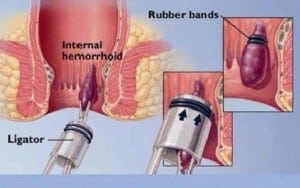 A hemorrhoid banding procedure is a simple, pain-free procedure used to treat problematic hemorrhoids.
A hemorrhoid banding procedure is a simple, pain-free procedure used to treat problematic hemorrhoids.
A hemorrhoid is a discomforting collection of swollen tissue and blood vessels in the lower rectum or anus, affecting more than half of adults at some point in their lives. Common causes include constipation, pregnancy, childbirth, obesity, heavy lifting, sitting for long periods and diarrhea. Home remedies, such as hemorrhoid creams, suppositories and warm baths may bring temporary relief, but hemorrhoids do not go away, can get worse over time, and can grow in size and number.
Midwest Endoscopy Center offers non-surgical hemorrhoid removal for internal hemorrhoids, that is proven effective, fast, and requires no anesthesia. Following testing to identify the type and number of hemorrhoids, we can immediately begin the “hemorrhoid banding” treatment and devise an after care plan to help you return to normal activities.
What is Hemorrhoid Banding?
During this brief procedure, small rubber bands are secured around the base of an internal hemorrhoid, where the tissue is less pain-sensitive, cutting off blood supply to the hemorrhoid. This allows the hemorrhoid to shrink in size, eventually falling off naturally during normal bowel movements. Most patients are unaware when this happens, and the site of the hemorrhoid usually heals completely within a week or two.
Treatment Sequence
Hemorrhoid banding is done in three appointments scheduled at two week intervals. Each appointment takes only about 15 minutes. The procedure itself is painless and no sedation is required. Within the first 24 hours after the banding procedure, patients may experience a slight ache at the location of the hemorrhoid, as well as a feeling of fullness or slight pressure at the site.
Medication
An over the counter pain medication is usually recommended for any post-procedure related complaints. Some rare cases may require more banding procedures aside from the initial three; if this occurs, the doctor will discuss any additional testing that may be required.
Helpful Links


